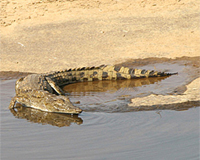| . |  |
. |
Paris (AFP) June 9, 2010 Distinct populations of snake species on three continents have crashed over the last decade, raising fears that the reptiles may be in global decline, according to a study published Wednesday. The pattern across the eight species monitored was alarmingly similar despite their geographical isolation, which points to a common cause such as climate change, the researchers said. Other factors known to play a role include habitat loss, pollution, disease, lack of prey and over-exploitation, either for food or trade. The study showed that 11 of 17 snake populations in Britain, France, Italy, Nigeria and Australia dropped off sharply over a four-year period starting in the late 1990s. "Our data revealed an alarming trend," the authors reported in the British Royal Society journal Biology Letters. "Two-thirds of the monitored populations collapsed, and none have shown any sign of recover over nearly a decade since the crash. Unfortunately, there is no reason to expect a reversal of this trend." Snakes are top predators among reptiles, and a sharp decline in their numbers would likely have serious consequences for many ecosystems. Earlier studies have turned up dwindling numbers for certain species and in some regions, especially the Mediterranean basin. But the new study presents the first evidence that snakes in the tropics are also in trouble. Depending on the continent, population declines varied depending on sex, with females disappearing significantly more rapidly than males in most cases. So-called 'sit-and-wait' foragers -- snakes that lie motionless, waiting for prey to come within striking distance -- are also more severely depleted in numbers than counterparts which are active hunters. The fact that the declines observed happened in different corners of the globe over the same short time points to a single problem. "We suggest that there is likely to be a common cause at the root of the declines, and that this indicates a more widespread phenomenon," the study concluded.
Share This Article With Planet Earth
Related Links Darwin Today At TerraDaily.com
 Crocodiles Ride Ocean Currents For Ocean Travel
Crocodiles Ride Ocean Currents For Ocean TravelSt Lucia, QLD (SPX) Jun 09, 2010 The mystery of how the world's largest living reptile - the estuarine crocodile - has come to occupy so many South Pacific islands separated by huge stretches of ocean despite being a poor swimmer has at last been solved by a group of Australian ecologists. Publishing their new study in the British Ecological Society's Journal of Animal Ecology, they say that like a surfer catching a wave, ... read more |
|
| The content herein, unless otherwise known to be public domain, are Copyright 1995-2010 - SpaceDaily. AFP and UPI Wire Stories are copyright Agence France-Presse and United Press International. ESA Portal Reports are copyright European Space Agency. All NASA sourced material is public domain. Additional copyrights may apply in whole or part to other bona fide parties. Advertising does not imply endorsement,agreement or approval of any opinions, statements or information provided by SpaceDaily on any Web page published or hosted by SpaceDaily. Privacy Statement |